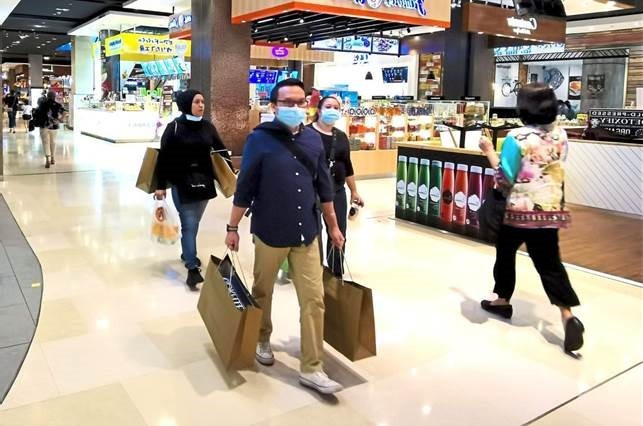
PETALING JAYA: Almost a month since most businesses were allowed to reopen under the conditional movement control order (MCO), a number of them are seeing their customers returning slowly but surely.
Among the businesses that have enjoyed strong sales of late are those related to essential services and goods such as groceries, food and beverage, transportation of goods, fertilisers, communications, computers and security.
Koong Lin Loong, chairman of the SMEs committee of the Associated Chinese Chambers of Commerce and Industry of Malaysia, said foot traffic at some malls has picked up over the last weekend.
“Quite a number of our members said they saw more customers at malls during the weekend.
“The numbers are the highest since May 4, when more businesses were allowed to operate under the conditional MCO.
“We didn’t even see that many customers before or during the Hari Raya festive season,” he said.
He added that consumer confidence is returning and the number of people who go shopping is increasing, albeit slowly, encouraged by the lower number of Covid-19 cases due to local transmission.
“There are sub-sectors that have not been much affected by the Covid-19 pandemic and they are doing better in sales.
“These include the manufacturing of food condiments, packaging material for essential goods, plastic pallets to transport goods and fertilisers used in plantations.
“Others that are reporting better sales are those who sell security cameras and computer products because more people are working from home,” he said, adding that products that can be sold online are generally doing well too.
Koong noted that factors such as market demand, dampened sentiments among consumers, and government policy continue to affect sales of certain products and services.
For example, about 30% of those who provide renovation services in the Klang Valley are still facing problems despite the recovering demand.
“Renovators and maintenance workers cannot accept jobs in nearby states because interstate travel is not allowed.
“Many of our members who operate malls and shopping complexes said scheduled or ad hoc repairs have to be delayed because their usual contractors or renovators cannot come over.
“For these renovators, more than 50% of their jobs are in nearby states,” he said. However, he expected this situation to be better as the government allows interstate travel for work-related emergencies since yesterday.
SME Association president Datuk Michael Kang said although some businesses had experienced improved sales, many others remained sluggish as consumers remained cautious amid the pandemic.
He said the retail sector, such as stores selling clothes and accessories, household items, gifts, sports and outdoors goods, and electronic products, has been adversely affected.
“Between 60% and 70% of these retail outlets have closed temporarily or permanently during the MCO.
“Only a small number of businesses have not been badly affected and they mostly provide essential services or goods such as groceries, food and beverages, transportation, communications, computer and security,” he said.
Calling on the government to expedite a comprehensive post-Covid-19 recovery plan to help businesses revive the country’s economy, he cautioned that even larger players will collapse without such support.
“Many of the government’s standard operating procedures (SOPs) are still not specific and clear, hence creating much confusion and fear among business operators.
“We need the government to act fast and efficiently,” he said, adding that if the market remains sluggish, big shopping malls and larger restaurants will likely go bust due to high overheads.
“Also, hypermarkets will be affected as consumers with less buying power will prefer to get their supplies online or from nearby convenience stores.
“There is little cash flow in the market now. Businesses have to drop the old ways and restructure their model by value-adding their products and services,” he added.
An entrepreneur who wants to be identified only as Wanie said following months of poor sales, she was forced to change the business model of her shop, which sold ready-made baju kurung at a mall in Shah Alam.
“I’m in the midst of closing down my outlet temporarily. I will focus on my online store for the time being.
“Although local cases of Covid-19 have gone down, I don’t think consumer confidence that will result in visits to malls and window-shopping will be back to normal so soon,” said the 40-year-old.
Despite the Hari Raya festive season, she said she did not record much sales at her outlet as most people still refrained from going to the malls.
“Relying on the physical store is not viable now. It is better to change before I make more losses,” she said, adding that she would consider reopening at the end of the year.
A human resource executive at a glove manufacturing company in Klang, who did not want to be named, said that despite the initial stages of the MCO, which required some of the management staff to work from home, his company’s production was not affected much.
“Since rubber gloves are essential items, our production lines are operating as usual.
“In fact, there have been more orders for several kinds of gloves meant for different uses and for the local and overseas markets,” he said.
Air-conditioner technician Mohd Zaba Latif, 45, whose shop is in Tanjung Malim, Perak, said his business had picked up since reopening in mid-May.
“There were customer queries even during the MCO but I could not operate.
“But now many bookings come in daily for service and installation,” he said, adding that he previously could not serve regular customers in a nearby Selangor town because of the ban on interstate travel.
“With the latest SOP allowing interstate travel for work, I now can go to customers in Kerling or Kuala Kubu Baru in Selangor,” he added.
Source: https://www.thestar.com.my/news/nation/2020/06/02/customers-returning-slowly-again

